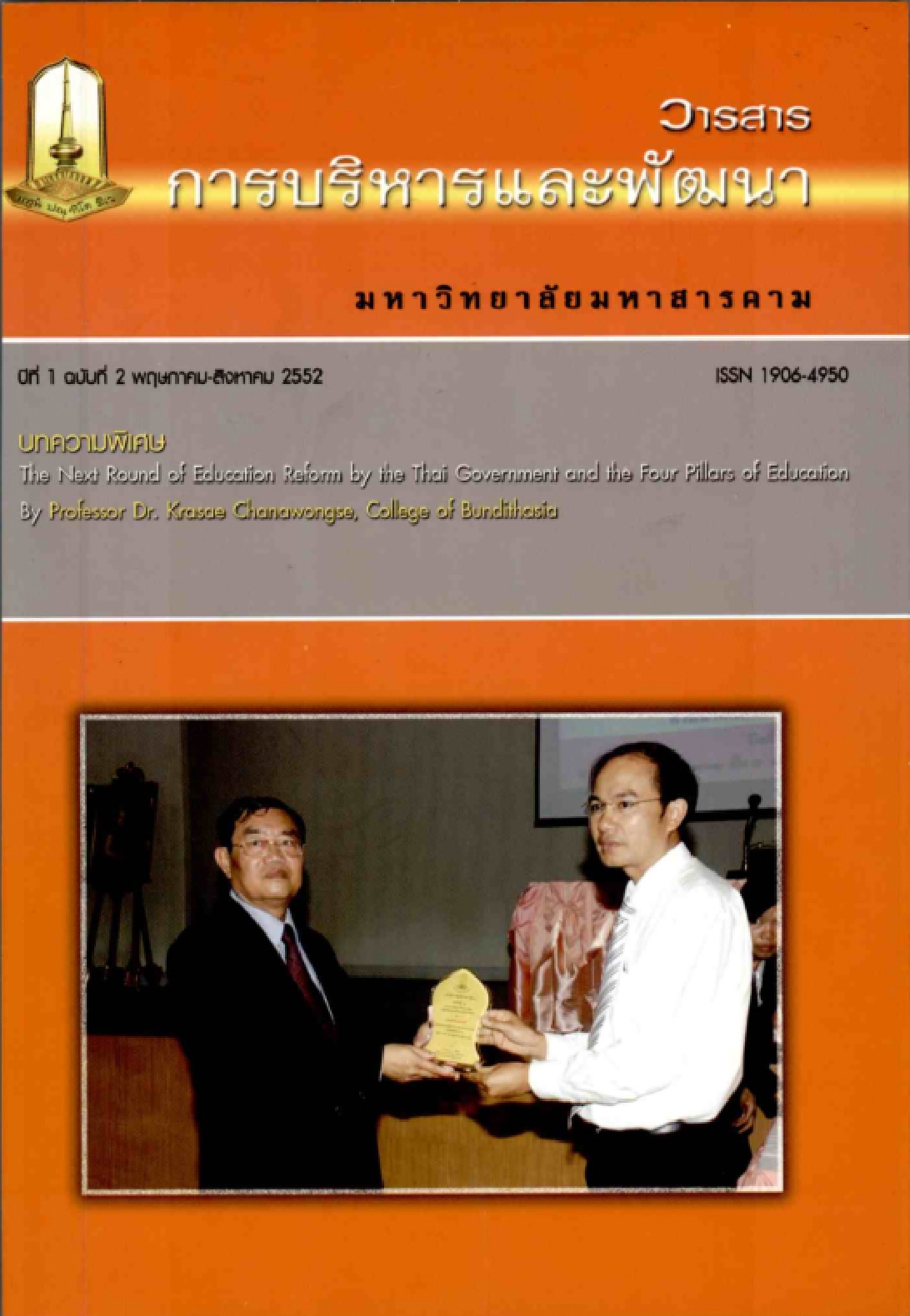Development of Instructional Model promoting Students' Analytical Thinking
Main Article Content
Abstract
This study aimed to: 1) examine current conditions and teachers' needs for learning organization to develop the students' analytical thinking process, 2) develop the teachers' learning organization development model promoting the students' analyti- cal thinking process, and 3) examine effectiveness of the learning organization development model promoting the students' analytical thinking process. The study was divided into 3 phases. Phase 1 examined current conditions and teachers' needs for learning organization. The target group consisted of 26 Phet Phitthayasan School teachers. Phase 2 developed the teachers' learning organization model for developing the students' analytical thinking process. The target group consisted of 22 fourth grade interval teachers at Phet Phitthayasan School. Phase 3 investigated effectiveness of the learning organization development model promoting the students' analytical thinking process. The target group consisted of 22 fourth grade interval teachers at Phet Phitthayasan School. The sample consisted of 160 fourth grade interval students in the academic year 2008. The instruments used in the study were a questionnaire on current conditions and needs for learning organization promoting the students' analytical thinking process, a test of students' analytical thinking, an evaluation form, plans for learning organization emphasizing analytical thinking, and a scale on attitude toward implementing knowledge in learning organization promoting analytical thinking. The statistics used in the study were mean () and standard deviation (S.D.).1Director of Phet Phitthayasan School the results of the study were as follows:1. In Phase 1 the conditions of teachers' learning organization for developing the students' analytical thinking process as a whole were at a medium level, and the teachers' needs for learning organization for developing the students' analytical thinking process as a whole were at the highest level. In Phase 2 the teachers' learning organization development model for developing the students' analytical thinking process focused on teacher development in 3 aspects: basic knowledge of analytical thinking, traning in the analytical thinking process to teachers, and knowledge of teaching analytical thinking with 6 development stages: preparing readiness, presenting problem situation, training in individual thinking, training in subgroup thinking, presenting or discussing thinking outcomes, and evaluating the thinking process.In Phase 3 the effectivenes of the learning organiza- tion development model for developing the students' analytical thinking process revealed the following:1) The teachers attending the training according to the model mentioned increased their mean score on analytical thinking at the .01 level of statistical significance. 2) Of all the teachers attending the training according to the model mentioned, 13 teachers could prepare learning plans emphasizing analytical thinking at the "very good quality" level; and g teachers at a good level.3) The teachers attending the training had attitudes toward implementing knowledge in learning organization for developing the teachers' analytical thinking process at the highest level. 4) The students increased their mean score on analytical thinking at the .01 level of statistical significance.
Downloads
Article Details
References
กองวิจัยการศึกษา. (2542). วิจัยเพื่อพัฒนาการเรียนรู้. กรุงเทพ: โรงพิมพ์การศาสนา.
เกรียงศักดิ์ เจริญวงศ์ศักดิ์. (2548). การพัฒนาการคิด. กรุงเทพ: เอช-เอ็นการพิมพ์.
ครุรักษ์ ภิรมย์รักษ์. (2544). การวิจัยในชั้นเรียน. ชลบุรี: โรงพิมพ์งามช่าง.
จริยา ภูสีฤทธิ์. (2550). การพัฒนาความสามารถในการคิดวิเคราะห์และผลสัมฤทธิ์ทางการเรียนวิทยาศาสตร์ของนักเรียนชั้นมัธยมศึกษาปีที่ 3. วิทยานิพนธ์ ศษ.ม.. มหาวิทยาลัยขอนแก่น, ขอนแก่น.
ทิศนา แขมมณี. (2546). ศาสตร์การสอน : องค์ความรู้เพื่อการจัดกระบวนการเรียนรู้ที่มีประสิทธิภาพ. กรุงเทพฯ:โรงพิมพ์จุฬาลงกรณ์มหาวิทยาลัย.
ผดุง เพชรสุข. (2548). กระบวนการพัฒนาครูในการสร้างหน่วยการเรียนรู้แบบบูรณาการ สำหรับการศึกษาขั้นพื้นฐาน. วิทยานิพนธ์ ศษ.ม.. มหาวิทยาลัยขอนแก่น, ขอนแก่น.
เพราพรรณ เปลี่ยนภู่. (2542). จิตวิทยาการศึกษา. กรุงเทพฯ : คณะครุศาสตร์อุตสาหกรรม มหาวิทยาลัยเทคโนโลยีพระจอมเกล้าธนบุรี.
ศึกษาธิการ กระทรวง. (2548). นโยบายกระทรวงศึกษาธิการ. สืบคั้นเมื่อ 24 กันยายน 2548, จาก http:// www.moe.go.th/websm/news_aug05/news_aug0521.htm.
สามัญศึกษา,กรม. (2540). ชุดฝึกอบรมด้วยตนเอง เรื่องการวิจัยในชั้นเรียน หน่วยที่ 4 นวัตกรรมทางการศึกษา.กรุงเทพ: สำนักพิมพ์เสมาธรรม.
มนูญ ชัยพันธ์. (2548). การพัฒนาหลักสูตรฝึกอบรมเรื่องการสร้างหน่วยการเรียนรู้แบบบูรณาการสำหรับครูประถมศึกษา. วิทยานิพนธ์ ศษ.ม.. มหาวิทยาลัยขอนแก่น, ขอนแก่น.
สำนักงานคณะกรรมการการศึกษาขั้นพื้นฐาน กระทรวงศึกษาธิการ. (2549). แนวทางการจัดการเรียนรู้เพื่อพัฒนาทักษะการคิดวิเคราะห์. กรุงเทพฯ: โรงพิมพ์ชุมนุมสหกรณ์การเกษตรแห่งประเทศไทย.
สำนักงานคณะกรรมการการศึกษาขั้นพื้นฐาน กระทรวงศึกษาธิการ. (2549). เจตนารมณ์ กระทรวงศึกษาธิการ:"2549 ปีแห่งการปฏิรูปการเรียนการสอน. กรุงเทพฯ: โรงพิมพ์ชุมนุมสหกรณ์การเกษตรแห่งประเทศไทย.
สำนักงานรับรองมาตรฐานและประเมินคุณภาพการศึกษา. (2548). ผลการประเมินคุณภาพสถานศึกษา.กรุงเทพฯ: คอมม่าการพิมพ์.
สำนักงานคณะกรรมการการศึกษาแห่งชาติ. (2545). สรุปแผนพัฒนาการศึกษาแห่งชาติ ฉบับที่ 8 (พ.ศ.2540-2544). กรุงเทพฯ: คุรุสภาลาดพร้าว.
สุธารพิงค์ โนนศรีชัย. (2550). การคิดวิเคราะห์และผลสัมฤทธิ์ทางการเรียนวิชาชีววิทยา ของนักเรียนชั้นมัธยมศึกษาปีที่ 5 ที่ได้รับการสอนแบบการเสาะหาความรู้ (SES). วิทยานิพนธ์ ศษ.ม. มหาวิทยาลัยขอนแก่น, ขอนแก่น.
อิสระ วาริยศ. (2545). ปัญหาและความต้องการของครูผู้สอนระดับประถมศึกษาในการพัฒนาการสอนโดยยึดผู้เรียนเป็นสำคัญ สังกัดสำนักงานการประถมศึกษาอำเภอพล จังหวัดขอนแก่น. วิทยานิพนธ์ศษ.ม.. มหาวิทยาลัยขอนแก่น, ขอนแก่น.
Baldwin, D. (2004). The Thinking Strand in Social Studies. Education Leardership, 42(1),September 1984.
National Council of Social Studies: NCSS. (2005). Social Studies for Early Childhood and Elementary School Children Preparing for the 21st Century.
Paul, R.W. (2004). Bloom : Taxonomy and Critical Thinking Instruction. Education Leadership,42(, May 1985.
Shelly, A.C. & Wilson, W.W. (2005). Sex Equity and Critical Thinking. Social Education,52(3),March 1988.
Thomas Hughes. (1993). An introduction to Mastery learning Theory Paper Presented at the annual Meeting of the American Education Research Association, New Orleans.
Yamane, T. (1973). Statistics : An Introductory. Analysis. 3d ed. New York: Harper.


